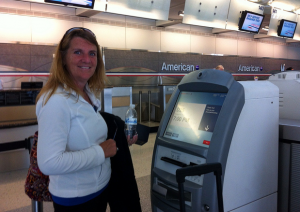We now live in a world saturated by self-service technology. There is an ever-increasing desire to see self-service kiosks in a variety of day-to-day locations. Kiosks have the ability to accelerate processes, which is crucial as customers are becoming less tolerant of big queues and waiting times.
The consumers are at the forefront of all retail businesses; a happy customer equals a drive in sales. Meanwhile, customers are becoming more expectant of efficient, quality service and a positive shopping experience. In store self- service is becoming the norm, shown by a recent study that reveals 85% of consumers want access to digital content on the shop floor.
In the world of hospitality, there is the perception that kiosks depersonalise customer service, but in reality self-service is reinventing customer experience for the better. They appreciate having more control over their experience with the reassurance of usable self-service technology.
Passengers want to avoid delays by reducing queuing times and have a stress-free pre flight experience.

Payment Kiosk
These statistics show that a proportion of the public would still prefer to interact with other humans. Whilst some customers remain traditional in their ways, a large percentage of people are now welcoming multi channel self-service. What type of consumer responds to self-service applications?
Self-service allows the consumer to take control and interact at their own pace, which is a novelty to most. In retail for example, kiosks are enabling consumers to explore and browse what a store has to offer, including its product range. With these applications in place, staff are able to focus on other aspects of customer service, leading to a rise in customer satisfaction. With faster paced lifestyles, consumers need timely processes to be sped-up and made a lot simpler. Self-service technology, as a whole, has transformed the customer experience in a plethora of locations.